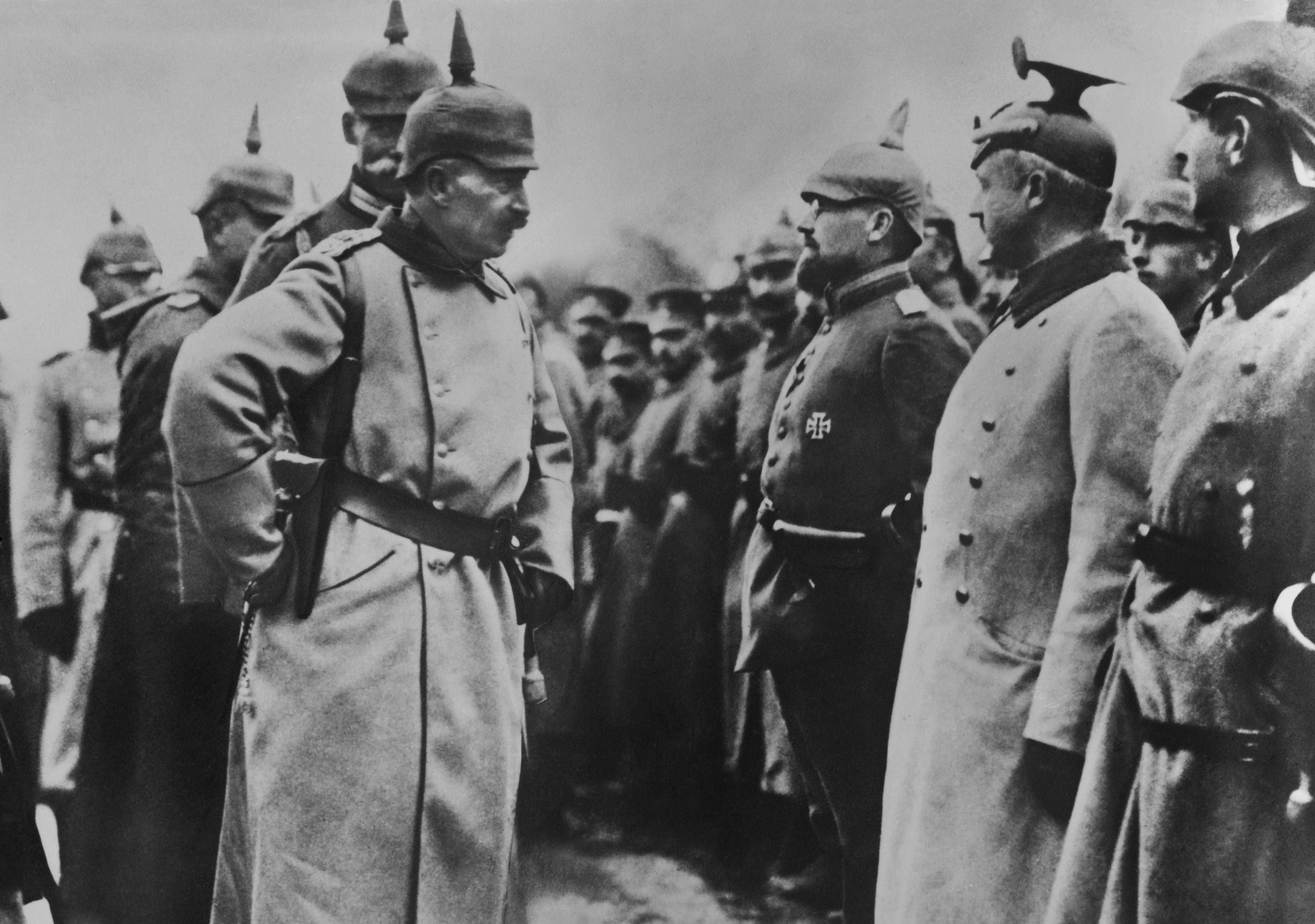When you fight a total war, and this was true of the First World War, you are not just fighting the armies on the ground or the navies on the sea or the planes in the air. What you are fighting is the whole fabric behind. The old distinction between the battlefront and those at home disappears, and so it becomes permissible to attack civilians. In the First World War, the technology was not yet advanced enough for both sides to do this very effectively, but they tried. The Germans used the navy to shell British ports. They also sent over Zeppelins armed with bombs over British cities such as London to cause damage. The British, for their part, imposed a naval blockade on Germany, which cut off war supplies but also cut off foodstuffs and hurt the German population.
Total wars
Professor of History
- A “total war” affects the totality of society: it is fought not just between two sets of armies, but between two societies.
- Those who were fighting found themselves with a very different war than the one that they had expected. By Christmas 1914, they were in a stalemate that would last until the end of the war in 1918.
- After the end of the war, there was a complex mix of emotions: a sense of loss and shock paired with revolutions and the belief that a better world would come of it.
“Total wars”
The term “total war” was not really used before the 20th century. I think it was because the wars of the 20th century were so vast and drew in so much of society, from those who fought in their millions to the society's resources, that people felt you had to have a new term for it. I think what total war came to mean – there's a lot of debate about its precise meaning, and I don't think we'll ever get a precise meaning – is something that draws in society. It draws in the resources, the labours of its women, its scientists and its artists. In other words, it affects the totality of society. It is total also because of the way it's fought since it’s fought not just between two sets of armies but between two societies.
Attacking civilians

Photo by Everett Collection
Destruction in the Second World War
Total war is total both in how it engages societies and expands the targets considered permissible to attack and in its aims. Instead of one side saying, ‘Look, we'll just try and get the other side to recognise they've been defeated, and then we'll have a negotiation’, total war becomes about obliterating the other side, totally destroying the other side, totally defeating the other side.
We see it even more in the Second World War when the technology made it possible to hit the enemy’s homelands in ways that weren't possible in the First World War. You have: the mass bombing of Germany by the British and American air forces, the bombing of Japan, Japan's bombing of Chinese and Filippino cities, Germany’s bombing of cities like Warsaw and Rotterdam and of course, London. The expansion of the targets was huge in the Second World War, and the potential for causing destruction was that much greater. It ended with two terrifying, monumental bombs, the atomic bombs – the first time and last time so far ever used – dropped on Hiroshima and Nagasaki, which leveled those cities and killed thousands of people.
There was also the aim, in the Second World War, of destroying the societies that they had defeated. You see it in the Nazis – how they tried to turn vast swaths of Europe’s population into slaves, essentially, working to feed the German war machine and German society. The Japanese did something similar. The allies, for their part, sought unconditional surrender. In other words, the enemy – in this case, Germany, Italy, Japan, and some of their allies – had to surrender completely and put themselves completely at the mercy of those who had won.
Limited wars
We have to remember that not all wars need to be like that. There can be limited wars. This is not to defend them, but it’s a different sort of war where, at a certain point, both sides are willing to sit down and talk. Limited wars tend to be, for obvious reasons, much less costly than total war.
In a limited war, when societies aren't engaged with each other, when it is more a matter of policy, at least those in charge – if they remain in charge – can call a stop. The danger of total war is that it arouses societies, and it arouses the passions in a way that makes it very difficult to come to a stop. However, a limited war, dreadful as war is, at least has the advantage of coming to an end.
One of the great difficulties is in knowing how to end a war. Wars are quite easy to start: you just attack someone, you start fighting, you get yourself into a war-like situation. Yet, wars take on their own momentum, and ending them has always been the problem.
Possible causes of the First World War
If you want to try and understand how the First World War started, the answer, I think, comes on different levels. If you want to look at the long underlying causes, then you can say that in Europe, there were tensions among the nations for 20 or 30 years before the First World War. There was a development of alliances. There was a development of a way of thinking as well – that war is perhaps a good thing or something that can be managed. Therefore, you can look at the underlying causes and say, well, it was possible Europe was going to get a war.
Notwithstanding, I think what you need to do is also bring in the actual decisions that led to the First World War. There were several crises before 1914 when there was talk of a general war, and people feared that it might happen and it didn't. My own view is that the underlying causes are not enough to explain why the war broke out. If the powers and individuals in charge had managed the crisis of 1914 a bit differently, there might not have been a war. That's certainly what a lot of people in Europe thought at the time. What is striking about the people’s reaction to the assassination of the Austrian archduke at Sarajevo is that it was very unfortunate. It was sad for him and sad for his family – his wife, of course, was assassinated with him – but it was just another crisis. The assassination took place on the 28th of June 1914, and Europe was in a general war by August 4th, 1914.
Getting closer to war

Photo by Everett Collection
I'm not sure it is always the role of historians to assign blame, but if you want to try and explain it, you can look at the great causes, the things that made war more likely. However, I think you also need to look at who decided what, like in that month that followed the assassination of the archduke.
This is a matter of such controversy. It will never be settled, but I think you can pick out certain things. You can say it was partly the fault of Austria-Hungary, which took the assassination of the archduke as an occasion and a very good excuse to destroy Serbia. Serbia was a country which had caused a lot of problems for Austria-Hungary, and in Vienna, the capital of Austria-Hungary, they decided the time had come to do something about it. The decision by certain people in the capital to go to war against Serbia was a decisive step towards a major war because they knew that Russia backed Serbia. Russia had made that perfectly clear: Serbia was its little Orthodox brother. Therefore, Austria-Hungary knew they were risking a war that would spread beyond Serbia to Russia, and they knew that if Russia got involved in a war, France, which was allied to Russia, was likely to get involved too.
The second crucial thing that happened – and again, many people would argue about this – was that the Austrians went to Berlin and said to their ally, ‘Will you back us if we try and destroy Serbia?’ The German high command, the German Kaiser and the German government knowing the danger that Russia might come into war, knowing the danger that the war might therefore become general, nevertheless said: ‘We back you’. They gave, what came to be called, the blank check. Thus, in that month, in July 1914, those two steps took Europe much closer to a war.
Unprepared for the unexpected
Initially, when the First World War broke out, those who were fighting and those who were in charge thought, ‘Well, we'll have a few battles, and then it'll all be decided. Then, we'll sit down and talk about peace; we'll probably be home by Christmas’, in that famous phrase of the time. What they hadn't realised was that the two sides were so evenly balanced that, in fact, it was going to be very difficult to achieve a victory.
By Christmas 1914, they had settled down into what they thought were temporary trenches. Little did they know, they had actually settled down into a stalemate that was going to last until the summer of 1918. Consequently, they found themselves with a very different war than the one that they had been expecting. They found themselves having to mobilise their societies in ways that they had never envisaged. The military and others had assumed, at the beginning of the war, that they had enough military equipment, enough shells, enough ammunition to fight the war. They found, in fact, in the first month, they used up everything they had, and they were having to suddenly redeploy their factories to produce stuff that kept on being consumed at ever-increasing rates.
Having enough men on the ground became very important. The British and the French were able to call on their first empires. The Germans had an empire, but it was nothing like what the British and the French had, so, the First World War quickly became a global war because soldiers from all over the British and French empires came to Europe, as well as to the Middle East, to fight.
A sense of loss
When the war ended in 1918, there was a sense of loss and of shock in Europe, a feeling that: we have done something to ourselves, which we will never recover from. We have taken collectively what was a prosperous continent, the most powerful part of the world, and we have depleted its resources. We have killed millions of its men. We have left it owing money to new powers, in particular the United States, and we are dealing with cities where people aren't getting enough to eat, where revolutions are breaking out, where it's not at all clear, in 1918, that the end of the war means there is going to be peace. A lot of fighting continued into the mid 1920s. As Winston Churchill said, ‘the war of the Giants is over, the war of the Pygmies will begin’. There were going to be wars in the centre of Europe, in the Baltics, and in the Balkans. There were going to be wars in the Middle East and in Central Asia. There was a feeling of pessimism, of gloom, of fear.
A time of revolutions

Photo by Everett Collection
At the same time, there was also a feeling of great relief that it was finally over, and in those countries that had won, there was a sense of victory. Thus it was a complex of emotions. Tied in with all of this was a sense that surely a better world must come out of all this destruction and waste. For some people, that meant revolution. A revolution had broken out in Russia in 1917, and it appeared that the Bolsheviks were building a new and better kind of society, so you had people thinking, ‘We need to remake society completely’. There were attempts at revolution and such transformations all over Europe in the period immediately following the end of the war, and even before the end of the war. I think there was also a sense, among those who didn't want a revolution, that we had to build fairer societies, but we also had to build new structures that would make it impossible for the world to have a war like this again.
Discover more about
The First World War
MacMillan, M. (2001). Peacemakers: Six Months that Changed the World. John Murray Press.
MacMillan, M. (2014). The War that Ended Peace: How Europe abandoned peace for the First World War. Profile Books.